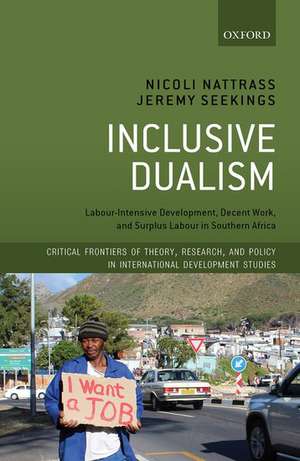Inclusive Dualism: Labour-intensive Development, Decent Work, and Surplus Labour in Southern Africa: Critical Frontiers of Theory, Research, and Policy in International Development Studies
Autor Nicoli Nattrass, Jeremy Seekingsen Limba Engleză Hardback – 29 mai 2019
Din seria Critical Frontiers of Theory, Research, and Policy in International Development Studies
- 18%
 Preț: 356.88 lei
Preț: 356.88 lei - 24%
 Preț: 496.88 lei
Preț: 496.88 lei - 26%
 Preț: 527.40 lei
Preț: 527.40 lei -
 Preț: 273.95 lei
Preț: 273.95 lei - 19%
 Preț: 498.42 lei
Preț: 498.42 lei - 19%
 Preț: 499.39 lei
Preț: 499.39 lei - 17%
 Preț: 215.78 lei
Preț: 215.78 lei - 6%
 Preț: 133.93 lei
Preț: 133.93 lei - 17%
 Preț: 581.95 lei
Preț: 581.95 lei - 28%
 Preț: 473.21 lei
Preț: 473.21 lei - 26%
 Preț: 543.40 lei
Preț: 543.40 lei - 30%
 Preț: 541.93 lei
Preț: 541.93 lei - 24%
 Preț: 468.33 lei
Preț: 468.33 lei - 10%
 Preț: 235.22 lei
Preț: 235.22 lei - 17%
 Preț: 495.01 lei
Preț: 495.01 lei - 15%
 Preț: 223.97 lei
Preț: 223.97 lei
Preț: 473.69 lei
Preț vechi: 620.93 lei
-24% Nou
Puncte Express: 711
Preț estimativ în valută:
90.64€ • 94.63$ • 75.02£
90.64€ • 94.63$ • 75.02£
Carte tipărită la comandă
Livrare economică 24-31 martie
Preluare comenzi: 021 569.72.76
Specificații
ISBN-13: 9780198841463
ISBN-10: 0198841469
Pagini: 230
Dimensiuni: 160 x 241 x 24 mm
Greutate: 0.5 kg
Editura: OUP OXFORD
Colecția OUP Oxford
Seria Critical Frontiers of Theory, Research, and Policy in International Development Studies
Locul publicării:Oxford, United Kingdom
ISBN-10: 0198841469
Pagini: 230
Dimensiuni: 160 x 241 x 24 mm
Greutate: 0.5 kg
Editura: OUP OXFORD
Colecția OUP Oxford
Seria Critical Frontiers of Theory, Research, and Policy in International Development Studies
Locul publicării:Oxford, United Kingdom
Notă biografică
Nicoli Nattrass is Professor of Economics at the University of Cape Town. She writes extensively on welfare, development, and public policy in South and Southern Africa, and has published numerous articles and books focusing on the political economy of inequality and health in South Africa, and on the interface between science and society. She is a regular Visiting Professor at Yale University, and is Co-Director of the Institute for Communities and Wildlife in Africa at the University of Cape Town, where her research focuses on the socio-economic determinants of human-wildlife conflict and on the role of science in policy making. She is the author of The Political Economy of South Africa (OUP, 1990) The Moral Economy of AIDs in South Africa (CUP, 2004), and Policy, Politics, and Poverty in South Africa (with Jeremy Seeking, Palgrave Macmillan, 2015).Jeremy Seekings is Professor of Political Studies and Sociology at the University of Cape Town. He writes extensively on welfare, development, and public policy in South and Southern Africa, and is a regular Visiting Professor at Yale University. He is the author of Policy, Politics, and Poverty in South Africa (with Nicoli Nattrass Palgrave Macmillan, 2015), Macroeconomics Simplified: An Introduction to Keynesian and Neo-Classical Macroeconomic Systems (Sage, 2014), and (with Nicoli Nattrass) Class, Race, and Inequality in South Africa (Yale University Press, 2005).
